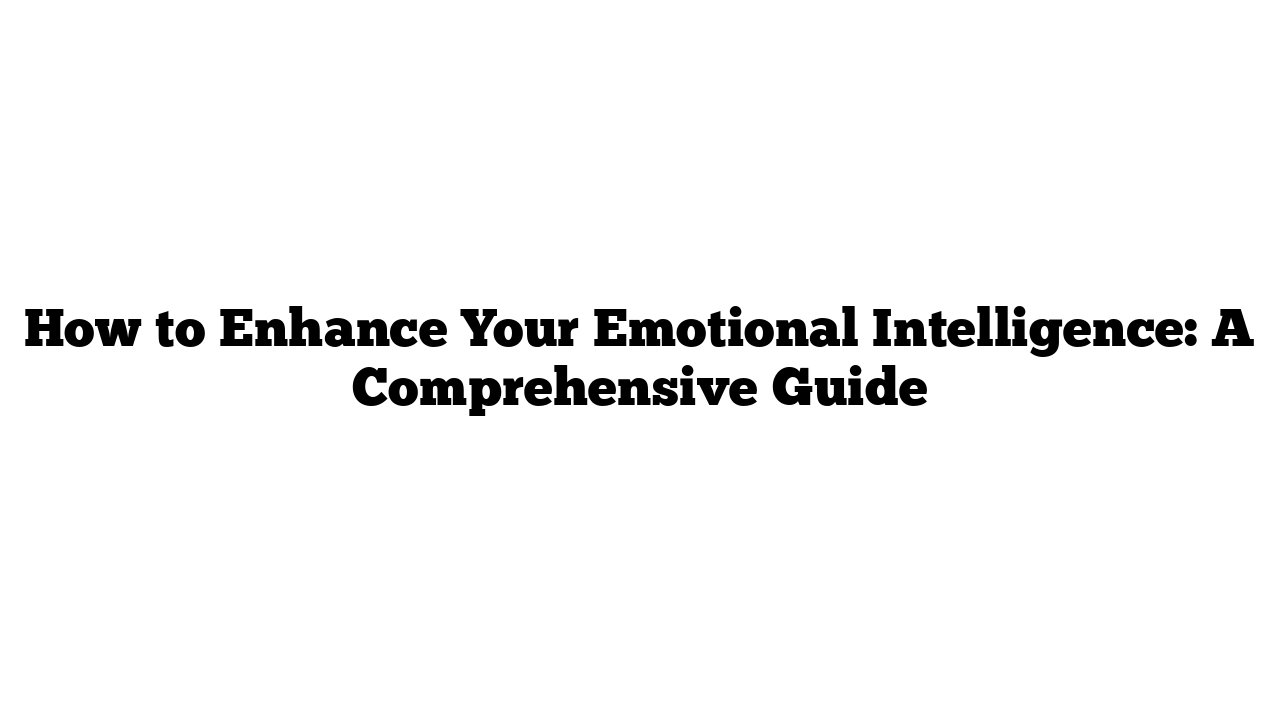Introduction to Emotional Intelligence
Emotional Intelligence (EI) is the ability to understand, use, and manage your own emotions, as well as the emotions of others. This skill is crucial for personal and professional success. In this article, we will explore practical steps to enhance your emotional intelligence and improve your relationships.
1. Self-Awareness: The Foundation of Emotional Intelligence
What is Self-Awareness?
Self-awareness is the first step toward enhancing your emotional intelligence. It involves recognizing your emotions, understanding their impact, and acknowledging how they influence your thoughts and behavior.
How to Improve Self-Awareness:
- Keep a Journal: Write down your thoughts and feelings daily. This practice helps you reflect on your emotional patterns.
- Seek Feedback: Ask friends or colleagues how they perceive your emotional reactions. Their insights can provide valuable perspectives.
- Mindfulness Practices: Engage in mindfulness activities such as meditation or deep breathing exercises to help you connect with your feelings.
2. Managing Your Emotions: Stay in Control
Why is Emotional Management Important?
Once you recognize your emotions, the next step is to manage them effectively. This means responding to feelings in a healthy manner rather than reacting impulsively.
Techniques for Emotional Management:
- Pause Before Responding: When you feel strong emotions, take a moment to breathe and collect your thoughts. This pause can prevent rash decisions.
- Reframe Negative Thoughts: Shift your perspective on challenging situations. Instead of thinking, “I can’t handle this,” try telling yourself, “I can learn from this experience.”
- Practice Stress Reduction Techniques: Engaging in physical activity, spending time in nature, or enjoying hobbies can help reduce stress and promote emotional balance.
3. Empathy: Understanding Others’ Emotions
What is Empathy?
Empathy is the ability to understand and share the feelings of others. It is a critical component of emotional intelligence that helps build strong relationships.
How to Cultivate Empathy:
- Listen Actively: Focus on what others are saying without interrupting. Show that you value their thoughts by nodding or providing affirmations.
- Put Yourself in Their Shoes: Consider how you would feel in someone else’s situation. This perspective can deepen your understanding and connection.
- Ask Questions: When someone shares their feelings, ask open-ended questions to encourage them to express themselves further.
4. Social Skills: Building Meaningful Connections
Why Are Social Skills Essential?
Strong social skills enable you to communicate effectively, resolve conflicts, and create lasting relationships.
Ways to Improve Your Social Skills:
- Practice Effective Communication: Be clear and concise when expressing your thoughts. Use “I” statements to convey your feelings without blaming others.
- Be Open to Feedback: Accept constructive criticism graciously. This openness fosters trust and respect in relationships.
- Engage in Group Activities: Participate in team projects or social events. These experiences can enhance your ability to work well with others.
5. Motivation: Driving Your Success
How Does Motivation Relate to Emotional Intelligence?
Motivation is a key factor that propels you toward achieving your goals. Individuals with high emotional intelligence are often more self-motivated and resilient.
Tips to Boost Your Motivation:
- Set Clear Goals: Define specific, achievable goals that inspire you. Having a clear vision helps maintain focus and determination.
- Celebrate Small Wins: Recognize and reward yourself for reaching milestones along the way. This practice builds momentum and keeps you motivated.
- Surround Yourself with Positivity: Engage with people who uplift and inspire you. Positive relationships can fuel your motivation.
Incorporating Emotional Intelligence in Daily Life
Practical Applications:
Incorporating emotional intelligence into your daily life can lead to healthier relationships and improved mental well-being. Practice these skills consistently, and over time, you will notice significant changes in how you interact with yourself and others.
Final Thoughts: Building Trust Through Emotional Intelligence
Developing emotional intelligence is a journey, not a destination. As you work on self-awareness, emotional management, empathy, social skills, and motivation, you’ll enhance not only your own life but also the lives of those around you. Remember, emotional intelligence is about understanding and connecting with yourself and others in meaningful ways.
For more insightful articles on health and well-being, visit medicaltimes.io.
References:
- Goleman, D. (1995). Emotional Intelligence: Why It Can Matter More Than IQ. Bantam Books.
- MindTools. (n.d.). Emotional Intelligence. Retrieved from MindTools
- Psychology Today. (n.d.). The Importance of Emotional Intelligence. Retrieved from Psychology Today
